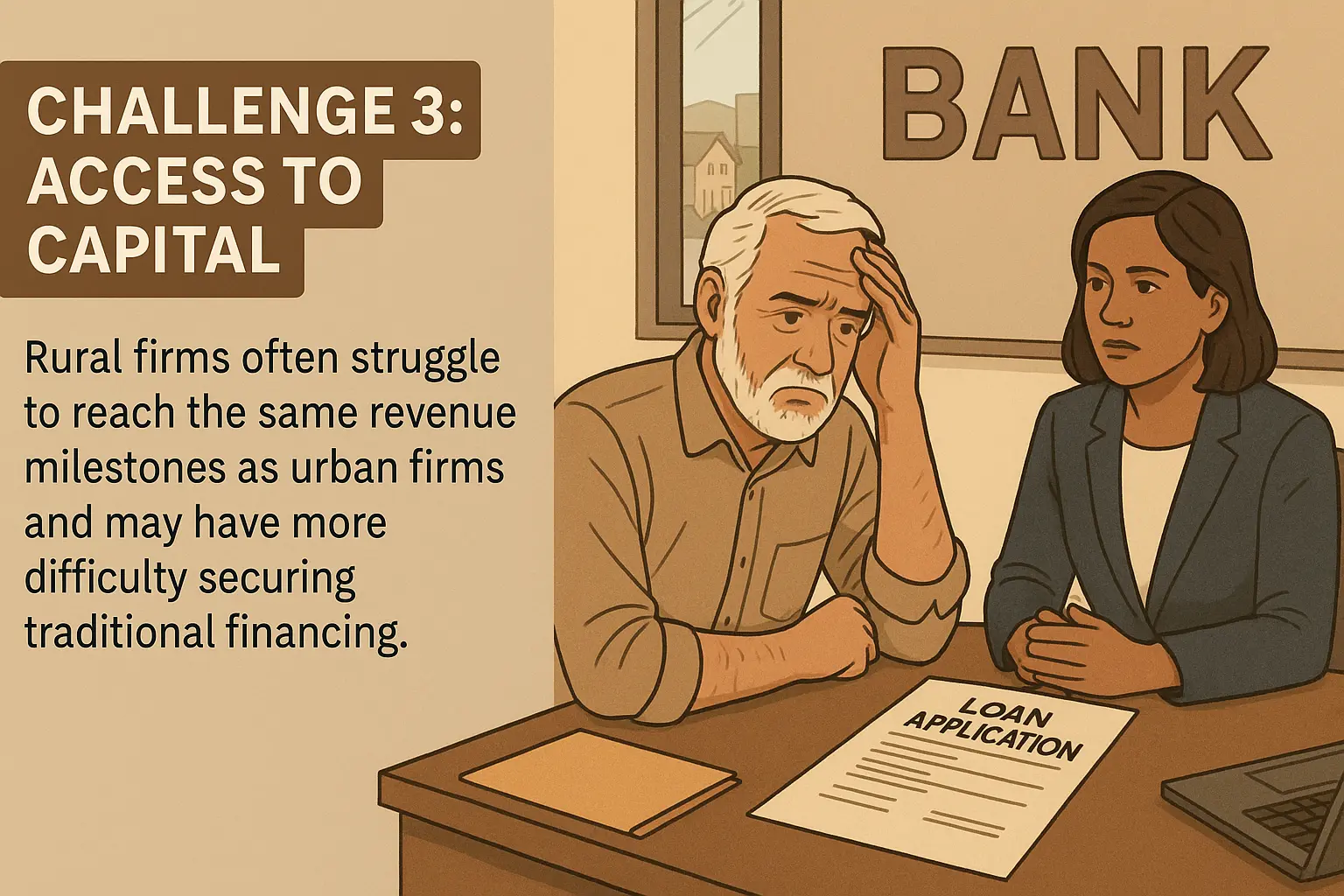Rural Entrepreneurship
The Rural Renaissance: A Guide to Building a Thriving Business Beyond the Big City
A quiet revolution is reshaping the entrepreneurial landscape. Fueled by the rise of remote work and a collective desire for a higher quality of life, a wave of skilled professionals, creatives, and founders is leaving major metropolitan hubs for the promise of rural America. They are bringing with them education, professional skills, and a drive to build something new, sparking a modern-day rural renaissance.
This isn't a retreat from ambition; it's a strategic relocation. Building a business in a small town offers a unique set of advantages: lower overhead, deeply connected communities, and untapped market opportunities. However, it also comes with a distinct set of challenges, from infrastructure gaps to hiring hurdles.
This guide is for the new generation of rural entrepreneurs. Drawing on proven strategies and the transformative power of technology, it provides a comprehensive roadmap for launching, marketing, and scaling a successful business in a small-town environment.
Funding and Resources for Rural Entrepreneurs
Don't let a lack of capital stop you. There are numerous programs designed to fuel rural business growth.
USDA Rural Development
This is the most significant source of funding. The Rural Business Development Grant (RBDG) program provides grants for training, technical assistance, and development for small rural businesses. They also offer loan guarantees and direct loans for a variety of needs.

Small Business Administration (SBA)
The SBA offers several loan programs, like the 7(a) and 504 loans, which can be used for real estate, equipment, and working capital. Their Lender Match tool can connect you with lenders in your area.

HUBZones (Historically Underutilized Business Zones)
If your business is located in a designated HUBZone, you can get special preference in winning federal contracts.

Marketing Your Small-Town Business: Building Community and Trust
In a small town, marketing is less about ad spend and more about relationships.
Get Involved: Sponsor the local Little League team. Set up a booth at the county fair. Join the Chamber of Commerce. Visibility and active participation in community life are your most powerful marketing tools.
Master Word-of-Mouth: Provide exceptional customer service. In a small town, a single bad experience can tarnish your reputation quickly, while a positive one can spread like wildfire. Encourage reviews and testimonials.
Partner with Other Local Businesses: Create joint promotions with non-competing businesses. A "dinner and a movie" special with the local theater, or a package deal with a nearby bed & breakfast, benefits everyone.
Hyper-Local Digital Marketing: Use social media to become the town's biggest cheerleader. Share photos of local events, spotlight other businesses, and post about community heroes. Use geo-targeting on platforms like Facebook and Google to run ads that only reach people within a specific radius of your business.
Tell Your Story: Share the history of your business and your connection to the town. People in small communities want to support their neighbors. Let them get to know the person behind the business.
Overcoming the Unique Challenges of Rural Entrepreneurship
Success requires a clear-eyed understanding of the unique obstacles rural businesses face and a strategic plan to overcome them.
Challenge 1: Workforce and Talent Attraction:
62% of rural small businesses say attracting workers to their community is a challenge. This is often due to a perceived lack of amenities, affordable housing, or high-quality childcare.

Solution: Embrace remote and hybrid work models. Technology allows you to tap into a global talent pool, not just a local one. For local hires, sell the lifestyle. Emphasize the benefits of work-life balance, community, and the unique culture of your region. Partner with local community colleges to develop training programs that build the skills you need locally.
Challenge 2: The Digital Divide
Rural businesses are three times more likely to lack affordable, reliable high-speed internet compared to their non-rural counterparts. This digital divide can be a major barrier to competing in a modern economy.

Solution: This is where technological innovation is critical. Explore emerging connectivity options like satellite internet (e.g., Starlink). Build your business processes around tools that can function in low-bandwidth or offline environments. Become an advocate for better infrastructure in your community; your business's success is tied to the region's technological advancement.
Challenge 3: Access to Capital
Rural firms often struggle to reach the same revenue milestones as urban firms and may have more difficulty securing traditional financing.

Solution: Look beyond traditional bank loans. There is a wealth of federal and state funding specifically earmarked for rural development. Programs from the USDA and the Small Business Administration (SBA) offer grants and loans designed to stimulate rural economies (more on this below).
The Rural Opportunity: Why Now is the Time
For decades, the narrative has been one of talent flight from rural areas to big cities. Today, that trend is beginning to reverse, creating a fertile ground for new ventures.
Lower Cost of Living and Operations: The most immediate advantage is financial. Commercial and residential real estate costs are a fraction of those in urban centers, dramatically lowering startup capital requirements and ongoing overhead. This financial runway allows entrepreneurs to invest more in their products, people, and growth.
Higher Quality of Life: Many are drawn to rural life for the promise of more space, a slower pace, and a closer connection to nature and community. This improved work-life balance can be a powerful tool for attracting and retaining talent tired of urban burnout.
Deep Community Connection: In a small town, businesses are not anonymous entities; they are neighbors. This creates opportunities for deep-seated loyalty and powerful word-of-mouth marketing that money can't buy. Your reputation is your greatest asset.
Untapped Markets: Rural communities often have service gaps left by the consolidation of larger corporations in urban areas. A locally-owned coffee shop, a skilled tradesperson, or a boutique retail store can quickly become an indispensable community hub with little direct competition.
America's Seed Fund (SBIR/STTR): For tech-focused or research-driven startups, these programs provide billions in early-stage capital through competitive grants.
State and Local Economic Development Agencies: Every state has its own set of programs and incentives for small businesses. Connect with your local or regional economic development office to learn about what's available.
Key Metrics of Rural Entrepreneurship
Analyzing the numbers behind rural success: an in-depth look at the key metrics driving the entrepreneurial boom in America's heartland.
360k
New Businesses Formed (2019-2021)
43%
Growth in Registrations
2.6x
Local Economic Multiplier
The Rural Entrepreneur's Toolkit: Business Ideas for a Small Town
The most successful rural businesses either fill a crucial local need or leverage the unique character of their location to attract outside customers.
Essential Local Services
These businesses become the backbone of the community.
- Skilled Trades: Reliable plumbers, electricians, HVAC technicians, and mechanics are always in high demand.
- Healthcare Services: A local clinic, dentist's office, or physical therapy center.
- Childcare and Elder Care: High-quality, affordable care is a major challenge in many rural areas and a critical need for working families.
- Auto and Farm Equipment Repair: Essential services that keep the local economy moving.
The New Town Square (Retail & Hospitality)
These businesses serve as community hubs.
- Coffee Shop & Bakery: Often the social center of a small town, providing a place for residents to connect.
- Restaurant or Brewery: A destination that reflects local tastes and can draw visitors from surrounding areas.
- Independent Grocery or Market: Focusing on local produce, meats, and goods from regional artisans.
- Hardware and General Store: A one-stop shop for daily needs.
Leveraging the Landscape (Agri-Tourism & Recreation)
These businesses turn rural assets into attractions.
- U-Pick Farm or Orchard: Seasonal operations for berries, pumpkins, apples, or flowers that attract families and tourists.
- Farm-to-Table Experiences: Hosting dinners, cooking classes, or workshops on your farm.
- Event Venue: Remodeling a barn or outbuilding to host weddings, corporate retreats, and community events.
- Outdoor Guiding Service: Offering guided hiking, fishing, hunting, or kayaking tours.
The Tech-Enabled Rural Business
These businesses use technology to bridge the urban-rural divide.
- Coworking Space: As you yourself have identified, this is a critical piece of infrastructure for the growing number of remote workers in rural areas, providing community and reliable internet.
- E-commerce Brand: Selling locally made crafts, foods, or products to a global audience online.
- Digital Marketing Agency: Serving other local businesses who lack the skills to market themselves online.
- IT Support & Services: Providing tech support for local residents and businesses who are far from the nearest big-box tech store.
Value-Added Agriculture and Food Systems
This category moves beyond traditional farming to focus on processing raw agricultural products into higher-value goods. This includes businesses that create artisanal foods, develop new food products, or establish direct-to-consumer models like farm-to-table restaurants and subscription boxes. It's about capturing more of the food dollar locally and creating a unique regional food identity.
Tech and Remote Work Innovation
This category encompasses businesses that leverage technology to overcome geographic barriers. This includes not only tech startups in software and e-commerce but also the infrastructure that supports a remote workforce, such as co-working spaces, rural broadband initiatives, and services that cater to the needs of location-independent professionals. This entrepreneurial area focuses on attracting and retaining talent in rural areas by creating a modern, connected work environment.
Moving to the Mojave Desert as a Remote First, Digital Employee and Small Business Owner From Los Angeles
From Silicon Beach Founder to Rural Entrepreneur. Why I Launched a First-of-Its-Kind Coworking Space near the Joshua Tree National Park in Downtown Twentynine Palms.

Join the High Desert's Rural Innovation Movement
Whether you're a local business owner, a remote professional, or a community leader in the Morongo Basin, let's connect. Reach out to discuss business growth, tech solutions, and collaborative opportunities to build a thriving future for Twentynine Palms and the High Desert.